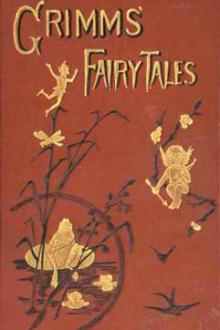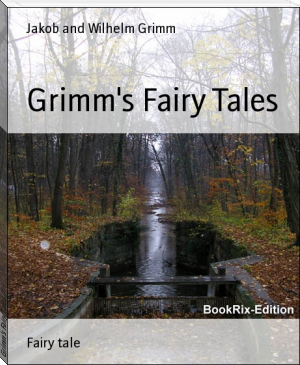Household Tales, Wilhelm Grimm [good books to read for women TXT] 📗

- Author: Wilhelm Grimm
- Performer: -
Book online «Household Tales, Wilhelm Grimm [good books to read for women TXT] 📗». Author Wilhelm Grimm
said he to himself, “that I have to waste away down here,” and as he was thus walking backwards and forwards, he once more came to the little chamber where the maiden had been sitting, and saw that the dwarf had a ring on his finger which shone and sparkled. Then he drew it off and put it on, and when he turned it round on his finger, he suddenly heard something rustle over his head. He looked up and saw spirits of the air hovering above, who told him he was their master, and asked what his desire might be? Hans was at first struck dumb, but afterwards he said that they were to carry him above again. They obeyed instantly, and it was just as if he had flown up himself. When, however, he was above again, he found no one in sight. Fir-twister and Rock-splitter had hurried away, and had taken the beautiful maiden with them. But Hans turned the ring, and the spirits of the air came and told him that the two were on the sea. Hans ran and ran without stopping, until he came to the sea-shore, and there far, far out on the water, he perceived a little boat in which his faithless comrades were sitting; and in fierce anger he leapt, without thinking what he was doing, club in hand into the water, and began to swim, but the club, which weighed a hundredweight, dragged him deep down until he was all but drowned. Then in the very nick of time he turned his ring, and immediately the spirits of the air came and bore him as swift as lightning into the boat. He swung his club and gave his wicked comrades the reward they merited and threw them into the water, and then he sailed with the beautiful maiden, who had been in the greatest alarm, and whom he delivered for the second time, home to her father and mother, and married her, and all rejoiced exceedingly.
167 The Peasant in Heaven
Once on a time a poor pious peasant died, and arrived before the gate of heaven. At the same time a very rich, rich lord came there who also wanted to get into heaven. Then Saint Peter came with the key, and opened the door, and let the great man in, but apparently did not see the peasant, and shut the door again. And now the peasant outside, heard how the great man was received in heaven with all kinds of rejoicing, and how they were making music, and singing within. At length all became quiet again, and Saint Peter came and opened the gate of heaven, and let the peasant in. The peasant, however, expected that they would make music and sing when he went in also, but all remained quite quiet; he was received with great affection, it is true, and the angels came to meet him, but no one sang. Then the peasant asked Saint Peter how it was that they did not sing for him as they had done when the rich man went in, and said that it seemed to him that there in heaven things were done with just as much partiality as on earth. Then said Saint Peter, “By no means, thou art just as dear to us as any one else, and wilt enjoy every heavenly delight that the rich man enjoys, but poor fellows like thee come to heaven every day, but a rich man like this does not come more than once in a hundred years!”
168 Lean Lisa
Lean Lisa was of a very different way of thinking from lazy Harry and fat Trina, who never let anything disturb their peace. She scoured everything with ashes, from morning till evening, and burdened her husband, Long Laurence, with so much work that he had heavier weights to carry than an ass with three sacks. It was, however, all to no purpose, they had nothing and came to nothing. One night as she lay in bed, and could hardly move one limb for weariness, she still did not allow her thoughts to go to sleep. She thrust her elbows into her husband’s side, and said, “Listen, Lenz, to what I have been thinking: if I were to find one florin and one was given to me, I would borrow another to put to them, and thou too shouldst give me another, and then as soon as I had got the four florins together, I would buy a young cow.” This pleased the husband right well. “It is true,” said he, “that I do not know where I am to get the florin which thou wantest as a gift from me; but, if thou canst get the money together, and canst buy a cow with it, thou wilt do well to carry out thy project. I shall be glad,” he added, “if the cow has a calf, and then I shall often get a drink of milk to refresh me.” “The milk is not for thee,” said the woman, “we must let the calf suck that it may become big and fat, and we may be able to sell it well.” “Certainly,” replied the man, “but still we will take a little milk; that will do no harm.” “Who has taught thee to manage cows?” said the woman; “Whether it does harm or not, I will not allow it, and even if thou wert to stand on thy head for it, thou shouldst not have a drop of the milk! Dost thou think, because there is no satisfying thee, Long Laurence, that thou art to eat up what I earn with so much difficulty?” “Wife,” said the man, “be quiet, or I will give thee a blow on thy mouth!” “What!” cried she, “thou threatenest me, thou glutton, thou rascal, thou lazy Harry!” She was just laying hold of his hair, but long Laurence got up, seized both Lean Lisa’s withered arms in one hand, and with the other he pressed down her head into the pillow, let her scold, and held her until she fell asleep for very weariness. Whether she continued to wrangle when she awoke next morning, or whether she went out to look for the florin which she wanted to find, that I know not.
169 The Hut in the Forest
A poor woodcutter lived with his wife and three daughters in a little hut on the edge of a lonely forest. One morning as he was about to go to his work, he said to his wife, “Let my dinner be brought into the forest to me by my eldest daughter, or I shall never get my work done, and in order that she may not miss her way,” he added, “I will take a bag of millet with me and strew the seeds on the path.” When, therefore, the sun was just above the center of the forest, the girl set out on her way with a bowl of soup, but the field-sparrows, and wood-sparrows, larks and finches, blackbirds and siskins had picked up the millet long before, and the girl could not find the track. Then trusting to chance, she went on and on, until the sun sank and night began to fall. The trees rustled in the darkness, the owls hooted, and she began to be afraid. Then in the distance she perceived a light which glimmered between the trees. “There ought to be some people living there, who can take me in for the night,”
thought she, and went up to the light. It was not long before she came to a house the windows of which were all lighted up. She knocked, and a rough voice from inside cried, “Come in.” The girl stepped into the dark entrance, and knocked at the door of the room. “Just come in,” cried the voice, and when she opened the door, an old gray-haired man was sitting at the table, supporting his face with both hands, and his white beard fell down over the table almost as far as the ground. By the stove lay three animals, a hen, a cock, and a brindled cow. The girl told her story to the old man, and begged for shelter for the night. The man said, “Pretty little hen, Pretty little cock, And pretty brindled cow, What say ye to that?”
“Duks,” answered the animals, and that must have meant, “We are willing,”
for the old man said, “Here you shall have shelter and food, go to the fire, and cook us our supper.” The girl found in the kitchen abundance of everything, and cooked a good supper, but had no thought of the animals. She carried the full dishes to the table, seated herself by the gray-haired man, ate and satisfied her hunger. When she had had enough, she said, “But now I am tired, where is there a bed in which I can lie down, and sleep?” The animals replied,
“Thou hast eaten with him, Thou hast drunk with him, Thou hast had no thought for us, So find out for thyself where thou canst pass the night.”
Then said the old man, “Just go upstairs, and thou wilt find a room with two beds, shake them up, and put white linen on them, and then I, too, will come and lie down to sleep.” The girl went up, and when she had shaken the beds and put clean sheets on, she lay down in one of them without waiting any longer for the old man. After some time, however, the gray-haired man came, took his candle, looked at the girl and shook his head. When he saw that she had fallen into a sound sleep, he opened a trap-door, and let her down into the cellar.
Late at night the woodcutter came home, and reproached his wife for leaving him to hunger all day. “It is not my fault,” she replied, “the girl went out with your dinner, and must have lost herself, but she is sure to come back tomorrow.” The woodcutter, however, arose before dawn to go into the forest, and requested that the second daughter should take him his dinner that day. “I will take a bag with lentils,” said he; “the seeds are larger than millet, the girl will see them better, and can’t lose her way.” At dinner-time, therefore, the girl took out the food, but the lentils had disappeared. The birds of the forest had picked them up as they





Comments (0)